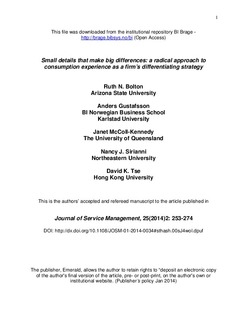Small details that make big differences: a radical approach to consumption experience as a firm’s differentiating strategy
Journal article, Peer reviewed

View/
Date
2014Metadata
Show full item recordCollections
- Scientific articles [2181]
Original version
Journal of Service Management, 25(2014)2: 253-274 10.1108/JOSM-01-2014-0034#sthash.00sJ4woI.dpufAbstract
Purpose – Service organizations and marketers have focused too much of their energy on their core service’s performance and too little emphasis on designing a customer journey that enhances the entire customer experience. There is nothing wrong with firms seeking continuous improvement in service quality and customer satisfaction. These efforts are needed for firms to be competitive in the marketplace. The problem occurs when performance levels and service offerings become too similar within an industry, so that price is the only competitive weapon that remains. We argue that in order to break this deadlock, companies need to focus on the small details that make big differences to customers.
Design/methodology/approach – The paper builds on interviews with executives in successful service organizations. It provides an analysis of differentiation strategies in diverse service organizations across consumption contexts, nations and cultures around the world.
Findings – We develop three research propositions and argue for radical approaches to help service organizations truly understand customers and provide service experiences that engage and delight them. We argue that the new challenge for marketing is to help companies find and implement these small details to make a large impact on the overall customer experience.
Originality/value – In order to truly understand the customer experience, we need a holistic view of all interactions customers have with a company. We need to understand the customer-firm interactions at all touch points, that is, during search, purchase, consumption and post-consumption. Customer experience involves the customers’ cognitive, affective, emotional, social and sensory responses to the firm. The originality of this research lies in our focus on the small details that make a difference to customers during the service process rather than in the final outcome of the service performance.
Description
This is the authors’ accepted and refereed manuscript to the article. Publisher's version is available at emeraldinsight.com